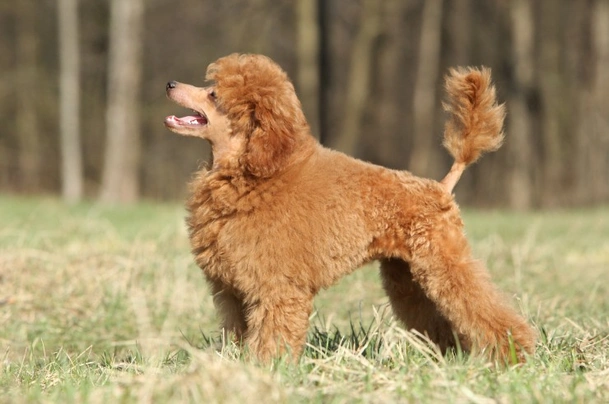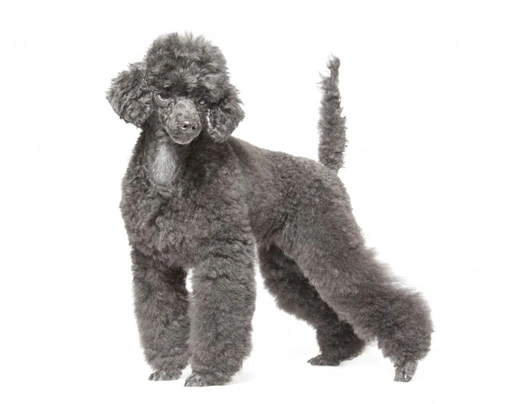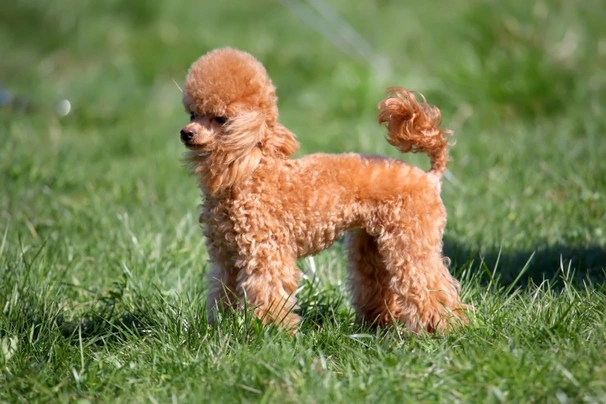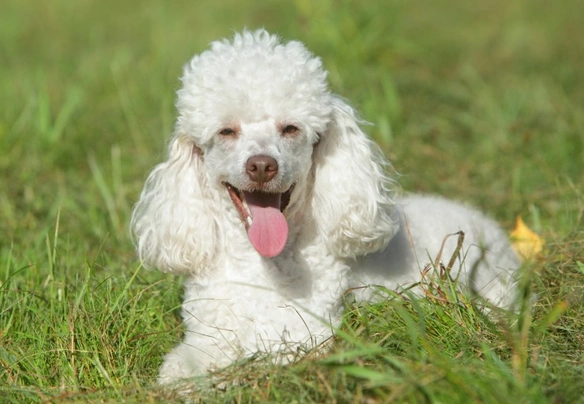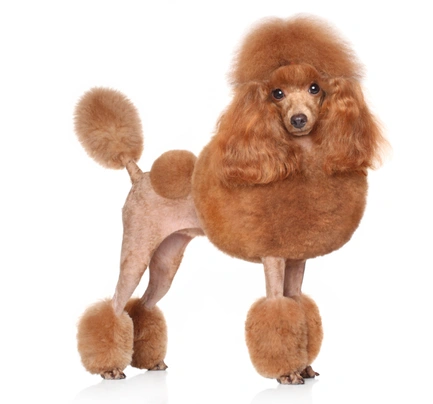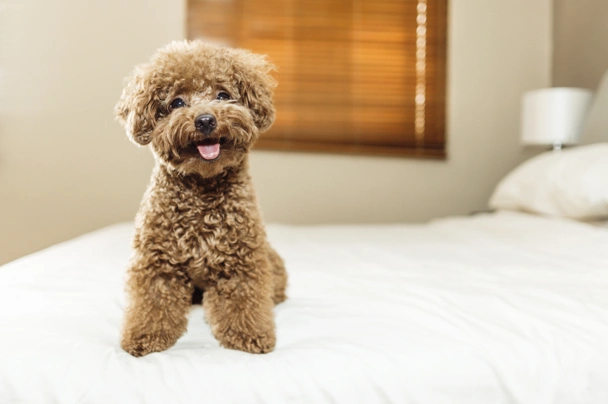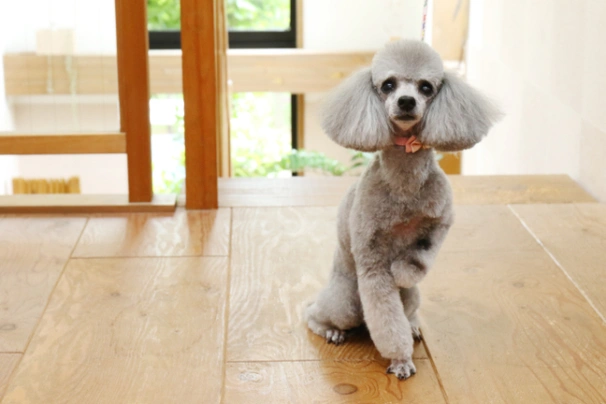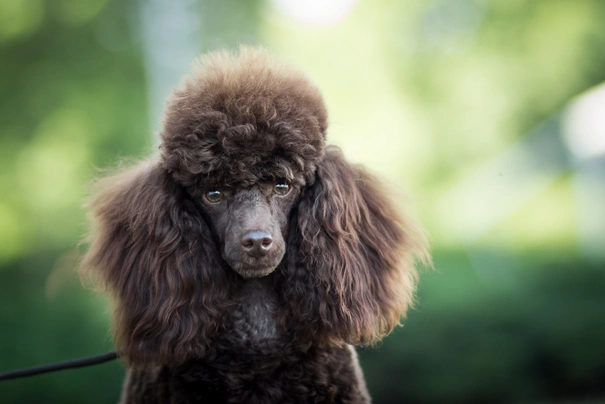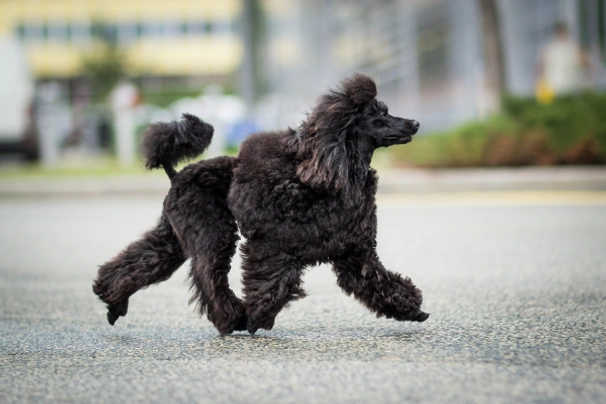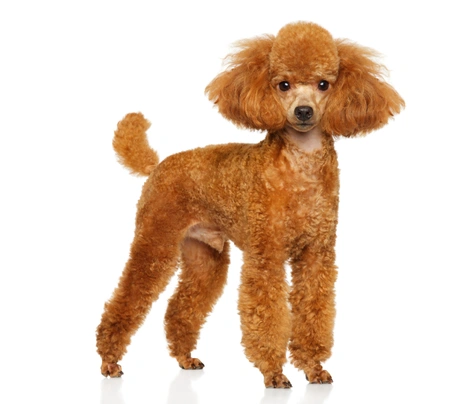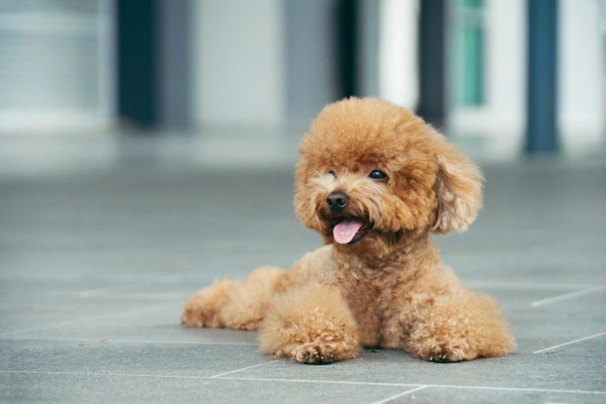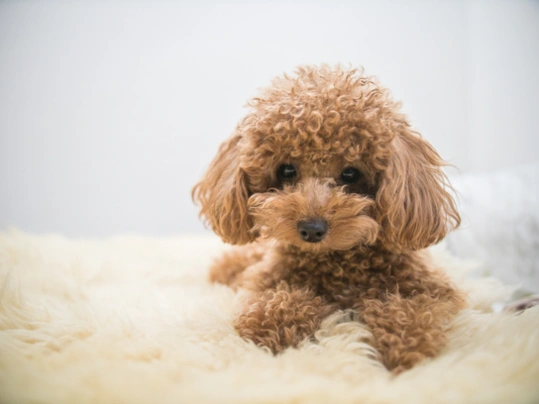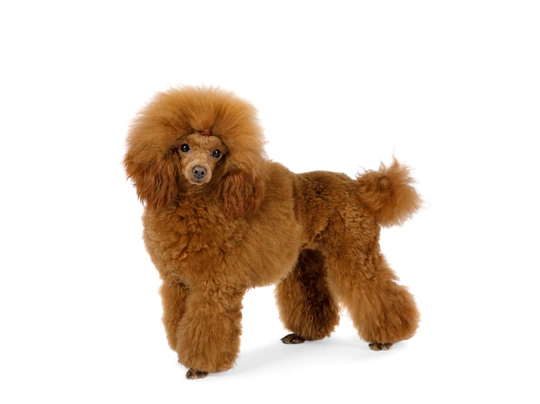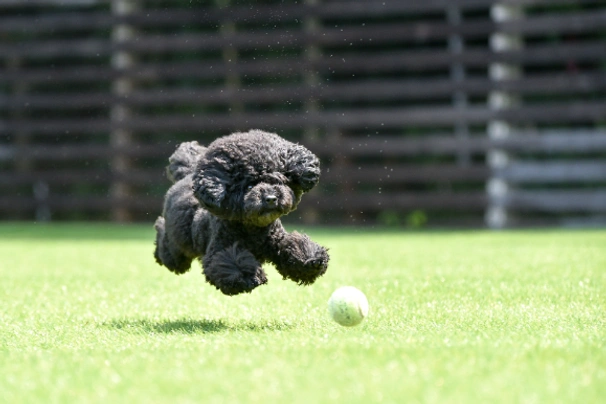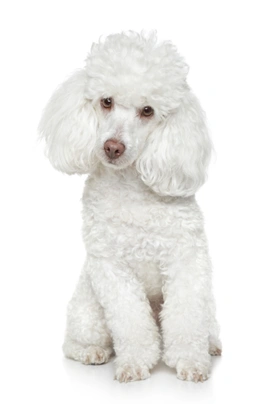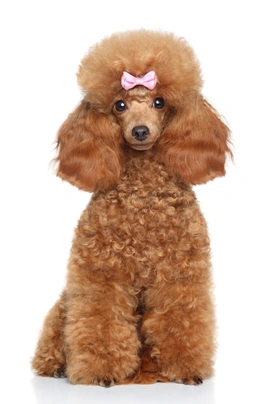Toy Poodle
Pros
Cons
Introduction of the Toy Poodle
The Toy Poodle is the smallest of all Poodle breeds and over the years these charming little dogs have proved to be among the most popular companions not only in the UK but in many other countries of the world too. Like the Standard and the Miniature Toy Poodles don't shed and this paired to the fact they are highly intelligent has seen these charming little dogs find their way into the hearts and homes of many people. They are also always well received in the show ring thanks to their desire to perform and please.
Toy Poodles are highly intelligent and learn new things extremely quickly which includes how to please their owners and families which all adds to their endearing personalities. They have an amazing sense of smell and at one time were trained as "truffle dogs" which saw them search find and then dig up these expensive delicacies and being so careful by nature they never damaged the truffles they found. Today the Toy Poodle has gone from strength to strength on the popularity chart although they are expensive to buy and known to suffer from quite a few health issues.
History of the Toy Poodle
It's thought the breed’s name “Poodle” comes from the German word 'pudel' which translated means "to plash in water". However the actual origins of the breed remain a bit of a mystery but some people think the breed's ancestors originally came from the East or from Africa and that these charming dogs found their way to Europe via Portugal.
Other people think the Toy Poodle like the Standard and Miniature Poodle originated in Eastern European countries which includes Russia and there is some thought that Poodles were taken to France by German soldiers during the war and as such France is listed as their country of origin although it’s more likely that the breed first appeared on the scene in Germany. The breed is thought to be an ancient one with Poodles existing 500 years ago. Toy Poodles became popular with European Royals during the 17th and 18th century when they were kept as pets and companions along with the Miniature Poodle.
There is evidence that the larger Standard Poodle was bred to work in marshlands where they were highly prized retrievers and known as excellent "duck dogs" whereas the smaller Toy Poodle was used to find and dig up valuable and expensive truffles. In times long past they were sometimes referred to a "Sleeve Poodles" because owners kept them as hand warmers when the weather was cold.
In France Toy Poodles were used as circus dogs because they were easy to train love to entertain and be the centre of attention. Being such intelligent dogs they learn new things quickly which includes all sorts of tricks and this includes some quite complicated and challenging circus acts. Poodles have remained a popular breed throughout the centuries and for good reason. They are highly intelligent extremely loyal and real clowns of the dog world which when all added up is why they are such a pleasure to be around. Today the Toy Poodle is also still one of the most popular breeds in the showring.
Interesting facts about the breed
- Is the Toy Poodle a vulnerable breed? No Toy Poodles are among the most popular breeds in the world including the UK
- Toy Poodles are used to create many of today's cross breed and hybrid dogs
- Toy Poodles are highly intelligent and sensitive dogs by nature
- When Poodles were first exhibited at dog shows they had long corded coats
- In times long past the Toy Poodle with their ultra-keen noses were used to find and dig up expensive truffles in France
- There are 3 sizes of Poodles namely Standard Miniature and Toy
- Their coats were trimmed in specific ways to prevent them from being too weighed down and so that Poodles still had enough protection around vital organs when jumping into freezing water
- A Poode's coat continuaously grows which is why they need trimming several times a year
Appearance of the Toy Poodle
Height at the withers: Males 24 - 28 cm Females 24 - 28 cm at the withers
Average weight: Males 3 - 6 kg Females 3 - 6 kg
The Toy Poodle has a proud and noble look about them although they can be real clowns of the dog world by nature. They are elegant and move gracefully with a prancing gait. Like the Standard and Miniature they boast having lovely even textured curly single non-shedding coats which makes them a good choice for people who suffer from pet related allergies. They have fine long heads with a slight peak and moderate stop. Their forefaces are well chiseled and strong with dogs having tight lips and well-defined chins.
Their eyes are dark in colour and almond shaped being set nicely on a dog's face with Toy Poodles always having a very keen and intelligent look about them. Their ears are set low and hang close to a dog's face having long and wide leathers. The Toy Poodle has a strong jaw with a perfect scissor bite where their upper teeth neatly overlap their lower ones. Their necks are well proportioned in relation to the rest of their bodies being strong and a nice length which allows dogs to carry their heads proudly.
They have well laid back muscular and strong shoulders with their legs being well muscled and straight. Chests are deep and quite wide with dogs having well sprung nicely rounded ribs. They have short strong and gently hollowed backs. Their loins are muscular and broad which adds to a dog's overall well-balanced and dainty appearance. They have strong back legs with well-developed thighs and their feet are small oval shaped with nicely arched toes and thick firm well cushioned pads and strong nails. Tails are thicker at the root being set high which dogs carry well away from their bodies and very straight.
When it comes to their coat the Toy Poodle boasts having an extremely profuse single coat that consists of short close lying thick dense and curly hair that covers their entire bodies. Their coats can be trimmed in various ways which is acceptable in the showring providing enough of a dog's coat is left for judges to determine the quality and colour of a dog’s coat. The accepted breed colours for registration with the Kennel Club are as follows:
- Apricot
- Black
- Blue
- Brown
- Cream
- Red
- Silver
- White
Tails
When it comes to tails traditionally Poodles had their tails docked but since the law banning the procedure was passed in 2007 puppies can no longer have their tails docked unless there is a medical reason for doing so which must be authorised by a vet with the correct documentation having been provided by a breeder or owner.
Gait/movement
When Toy Poodles move they do so freely with a light happy gait and lots of drive covering a lot of ground for such small dogs.
Faults
The Kennel Club frowns on any exaggerations or departures from a Poodles breed standard and would judge the seriousness of a fault on how much it affects a Toy Poodles overall health and wellbeing as well as their ability to perform.
Male Toy Poodles should have both testicles fully descended into their scrotums. It is also worth noting that a Toy Poodle can be a little smaller or bigger and they can be slightly heavier or lighter than described in their Kennel Club breed standard which is to be used only as a guide.
Temperament of the Toy Poodle
Toy Poodles are highly versatile and intelligent little dogs that thrive on human company. They adore being the centre of attention and are quick to learn how to please their owners and families. Providing a Toy Poodle is given lots of attention mental stimulation and daily exercise they are just as happy living in an apartment in town as they are living in a house in the country with a big back garden.
Toy Poodles are high-spirited intelligent little dogs that boast having a happy outlook on life. They thrive in a home environment loving nothing more than to be involved in everything that goes on around them which makes them the ideal companion. They are real clowns and love to entertain and be entertained becoming totally devoted to their owners. They are best suited to households where at least one person stays at home when everyone else is out of the house so they always have company. They are a good choice for first time owners providing they have the time needed to dedicate to their canine companion and their specific grooming needs.
Because they are so smart they are just as quick to pick up bad habits and behaviours which is why a puppy's training must begin as soon as they arrive in their new home by teaching them the "basics" and boundaries. Their training can start in earnest once they've been fully vaccinated. They form extremely strong ties with their owners which although endearing can turn into a bit of a problem if a dog is left on their own for any length of time. Toy Poodles often suffer from separation anxiety if they find themselves alone and if not kept occupied and given enough exercise and things to do they can become neurotic and destructive around the home.
It's very important for these dogs to be well socialised from a young age so they grow up to be confident outgoing mature dogs and not timid and withdrawn. Their socialisation must include introducing them to lots of new situations noises people other animals and dogs once they have been fully vaccinated. It's also crucial for their training to start early too and it must be consistent throughout a dog's life so they understand what is expected of them. A Toy Poodle is never happier than when they know their place in the pack and who they can look to for direction and guidance. If they don't know who is the alpha dog in a household they may quickly take on the role of dominant dog which can make them harder to live with and handle.
Because they are so charming and small it's all too easy to let a Toy Poodle get away with things that larger dogs would never be allowed to do. This can lead to dogs developing a condition known as "Small Dog Syndrome" which can make it challenging to live with them. As such it's best to always treat a Toy Poodle with a firm yet gentle and fair hand making sure they are not allowed to do anything that could lead to them becoming spoilt and unruly.
Although affectionate and loyal to their owners the Toy Poodle can be a little aloof around people they have never met before but rarely would they show any sort of aggression towards strangers preferring to keep their distance and bark until they get to know someone. They are better suited to households where one person stays at home when everyone else is out so they never have to spend too much time on their own.
Are they a good choice for first time owners?
Toy Poodles are a great choice for first time dog owners because they are so adaptable versatile happy and highly trainable little dogs that just love to please and they thrive on being in a home environment and involved in everything that goes on around them.
What about prey drive?
Toy Poodles are feisty by nature and will happily chase a smaller animal if they get the chance which is why care should be taken when they are anywhere near livestock or wild animals when out on a walk. Because they have such a tremendous sense of smell if a Toy Poodle picks up an interesting scent they would quite easily take off to investigate what's at the other end turning a deaf ear to any commands they are given.
What about playfulness?
Toy Poodles are playful by nature and thrive on not only being entertained but on entertaining their owners and families. They adore being at the centre of attention and quickly learn how to please which is just one of the reasons they have consistently remained at the top of the list of most popular dogs throughout the world. Toy Poodles can often be seen competing at high levels in competitions and more especially in agility which they truly excel at.
What about adaptability?
Toy Poodles are highly versatile and adaptable little dogs being just as happy living in a house in the country as they would be living in an apartment in town providing they are given loads of mental stimulation and daily exercise together with lots of attention.
What about excessive barking?
If not gently curbed when young a Toy Poodle can quickly learn that by barking they get all the attention they thrive on. This can lead to a dog barking incessantly for very little reason. The key to preventing a dog from developing this kind of behaviour is to nip things in the bud firmly yet gently right from the word go. However it’s important not to scare a Toy Poodle into not barking at all or to bark even more in the process. With this said any dog including Toy Poodles when left on their own for longer periods of time could well start barking excessively as a way of showing how unhappy and stressed out they are.
Do Toy Poodles like water?
Toy Poodles are real "water dogs" and will happily play in it and go for a swim to cool off which is why care should always be taken when walking a pet anywhere near more dangerous watercourses just in case they decide to leap in. Dogs should not be allowed to go in swimming pools because of the chemicals used to keep a pool clean can be harmful to them and more especially their ultra-sensitive eyes noses and ears.
Are Toy Poodles good watchdogs?
Toy Poodles may not be big but they are effective watchdogs being quick to let an owner know when something they don't like is going on in their environment and when there are strangers about. However because of their small size anyone wanting a more impressive watchdog would do better to share their homes with a larger dog.
Intelligence / Trainability of the Toy Poodle
Toy Poodles like their Miniature and Standard cousins are exceptionally intelligent and extremely fast learners. The downside to this is they are just as quick to pick up bad habits as they are the good. They are also extremely sensitive to a person's voice and the way things are said which is one of the reasons why they are so easy to train. As such in the right hands and environment these little dogs are highly trainable and why in times long past they were often seen performing in circuses.
With this said their training must start early and it has to be consistent and always fair throughout a dog’s life so they understand what their owners expect of them. Toy Poodles are never happier than when they are given something to do which is why they are so amenable to learning new things. They excel at many canine sports which includes activities like flyball and agility because they thrive on the attention they are given during their training and the one-to-one contact when competing with their handlers.
The key to successfully training a Toy Poodle is to make their training as interesting as possible and to avoid too much repetition. It's also a good idea to keep training sessions short which helps dogs stay more focussed on what it’s being asked of them bearing in mind that the more intelligent a dog is the faster they get bored and that Toy Poodles are extremely smart little dogs.
As previously mentioned Toy Poodles excel at all sorts of canine sports and more especially agility where they are often seen competing at high levels against other breeds. Because they are so sensitive to a person's voice and the tone used they are ultra-fast at picking up on what they are being asked to do which is why they are so good at many sports. They do not answer well to harsh correction or any sort of heavy handed training methods but they do respond extremely well to positive reinforcement which always brings the best out of these intelligent and quick-witted dogs especially when there are high value rewards involved.
It's very important to set out ground rules and boundaries when sharing a home with a Toy Poodle and the first commands a puppy should be taught as soon as they arrive in their new homes are as follows:
- Come
- Sit
- Stay
- Quiet
- Leave it
- Down
- Bed
Children and other
Toy Poodles are normally good around children although due to their small size they are best suited to households where the children are older and who therefore know how to behave around small dogs and more especially know how to handle them and play with them.
When dogs have been well socialised from a young enough age they generally get on well with other dogs they meet and if they have grown up with a family cat in a household they usually get on well together. However a Toy Poodle would think nothing of chasing off any other cats they encounter because they would see them as fair game. They are usually good around other smaller pets in a household especially if they have grown up with them around. However care must be taken when they are around smaller animals they don't already know just to be on the safe side.
Health of the Toy Poodle
The average life expectancy of a Toy Poodle is between 14 and 15 years when properly cared for and fed an appropriate good quality diet to suit their ages.
The Toy Poodle is known to suffer from a few hereditary health issues which are worth knowing about if you are planning share your home with one of these small energetic and intelligent dogs although in general they are a healthy breed. The conditions that seem to affect the breed the most include the following:
- Diabetes Mellitus
- Distichiasis
- Hyperadrenocorticism
- In-growing eye lashes
- Epilepsy
- Legge Perthes disease
- Progressive retinal atrophy (PRA) – Breeders should have stud dogs DNA tested
- Von Willebrands Disease (vWD) Type 1 - test available
- Ear problems
- Skin tumours
- Cataracts
- Cushing’s disease
- Bladder stones
More about ear infections
Poodles are predisposed to suffering from ear infections which is why it is so important to keep their ears free of hair and to keep them as clean as possible. Because Toy Poodles benefit from being professionally groomed every few weeks it's the best time to have hair in a dog's ears carefully and gently removed by an expert.
More about PRA testing
Fortunately there is a DNA test available for Toy Poodles which all responsible breeders use to ensure their breeding stock is free of Progressive Retinal Atrophy and all potential owners should ask to see that parent dogs have been tested clear before buying a Toy Poodle puppy from them.
What about vaccinations?
Toy Poodle puppies would have had their first vaccinations but it's essential for them to have their follow-up jabs at the right time with the vaccination schedule being as follows:
- 10 -12 weeks old bearing in mind that a puppy would not have full protection straight away but would be fully protected 2 weeks after they have had their second vaccination
There has been a lot of discussion about the need for dogs to have boosters. As such it's best to talk to a vet before making a final decision on whether a Toy Poodle should continue to have annual vaccinations which are known as boosters.
What about spaying and neutering?
A male Toy Poodle can safely be neutered when they are 6 months old and females can be spayed when they are 6 months old too.
What about obesity problems?
Some Toy Poodles gain weight after they have been neutered or spayed and it's important to keep a close eye on their calorie intake and the amount of daily exercise they get to prevent obesity. An obese Toy Poodle would be put at risk of developing certain health issues which could end up shortening their lives by several years.
What about allergies?
Toy Poodles are prone to developing skin allergies which if left untreated can prove notoriously hard to clear up. With this said allergies can be triggered by several things which includes the following:
- Environment
- A reaction to certain chemicals commonly found in household cleaning products
- Seasonal allergies which includes pollen and grasses
- Food which includes certain meats and cereals often used as ingredients in commercially produced dog food
- Tick and flea bites
- Dust mites
- Mould
Participating in health schemes
All reputable Toy Poodle breeders would have their stud dogs tested for specific conditions to ensure any puppies they breed are less at risk of inheriting certain disorders known to affect the breed. It is also worth noting that when breeders say that parent dogs and puppies have been "vet checked" that it is not the same thing as them having been "health tested".
The scheme available for Toy Poodles is as follows:
The Kennel Club also recommends that all breeders including Assured Breeders have their dogs tested under the following schemes:
What about breed specific breeding restrictions?
Currently there are not extra breed specific breed restrictions in place for Toy Poodles under the Kennel Club rules.
What about Assured Breeder requirements?
It is mandatory for all Assured Breeders to have their stud dogs tested using the following schemes and the Kennel Club strongly advises other breeders to do the same:
The Kennel Club also recommends that all breeders use the following schemes to test their dogs before using them for breeding purposes:
Caring for the Toy Poodle
As with any other breed Toy Poodles need to be groomed on a regular basis to make sure their coats and skin are kept in top condition bearing in mind that Toy Poodles benefit from having their coats professionally groomed every several weeks or so. They also need to be given regular daily exercise to ensure they remain fit and healthy. On top of this dogs need to be fed good quality food that meets all their nutritional needs throughout their lives.
Caring for a Toy Poodle puppy
A Toy Poodle puppy would have been wormed before being sold and the documentation a breeder provides for a puppy must have all the details of their worming date and the product used as well as the information relating to their microchip. It is essential for puppies to be wormed again keeping to a schedule which is as follows:
- Puppies should be wormed at 6 months old
- They need to be wormed again when they are 8 months old
- Puppies should be wormed when they are 10 months old
- They need to be wormed when they are 12 months old
Things you'll need for your puppy
There are items needed to care for a puppy which should be purchased well in advance of their arrival. The items needed include the following:
- Feed and water bowls making sure they are not too deep and ideally they should be ceramic rather than plastic or metal
- A good quality dog collar harness and lead
- A dog crate that's not too small or too big that a puppy would feel lost in it
- A well-made dog bed bearing in mind that a puppy could well chew on it
- Baby and/or dog blankets to use in the puppy's crate and dog bed
- Dog specific toothpaste and tooth brush
- A selection of good quality toys and chews for a puppy to gnaw on
- Shampoo and conditioner specifically formulated for use on dogs
- Grooming equipment
Keeping the noise down
All puppies are very sensitive to loud noises so it is important to keep the volume of a television down and not to play music too loudly either because it could frighten a Toy Poodle puppy and prevent them from napping as they should during the day.
Keeping vet appointments
Reputable breeders would always ensure their puppies vaccinated before they are sold but as previously mentioned it is up to their new owners to make sure they are given their follow-up shots at the right time which should be as follows:
- 10 -12 weeks old bearing in mind that a puppy would not have full protection straight away but would only be fully protected 2 weeks after they have had their second vaccination
When it comes to boosters it's best to discuss these with a vet because there is a lot of debate about whether a dog really needs them after a certain time. However if a dog ever needed to go into kennels their vaccinations would need to be
What about Toy Poodles when they reach their golden years?
When Toy Poodles reach their golden years they slow down in many ways and they might start showing their age with more grey hairs appearing on their faces and more especially around their muzzles. Apart from a change in their appearance an Toy Poodle's personality might change too and this includes on how quick they are to respond to a command or when their names are called. The reason for this is that many older dog's hearing is not as good as it once was. Other changes to watch out for in a Toy Poodle when they reach their senior years include the following:
- Their vision might be impaired and their eyes seem cloudy
- Their teeth might not be as in good condition which means they may need dental work
- Older dogs tend to sleep more during the day and they get up more frequently at night which is often because their cognitive function is not as sharp as it was when they were young which means older dogs are more easily confused
- They tend to be less tolerant of loud noises and sounds
- Dogs when they are older can be a little fussier about their food so it's important to rethink their diet and to make sure they are getting all the nutrients they need to stay healthy
- An older dog's immune system often does not offer them the same protection against illness and infection which puts them more at risk of catching something and why they should see the vet more routinely
- An older Toy Poodle might not be so keen to go out for a walk and more especially longer ones
- They muscle tone and body condition is not as good as when they were young
- Older dogs often suffer from joint problems which can then lead to arthritis so it's well worth investing in a comfy dog bed and ideally one that a Toy Poodle finds easier to get out of
Grooming of the Toy Poodle
Toy Poodles boast having a profuse thick and dense single coat that consists of masses of curls that cover their entire bodies. They shed very little but this does not mean they are easy maintenance because just the opposite is true. Toy Poodles are high maintenance on the grooming front because their coats need to be brushed every day to prevent any tangles and matts from forming. Their coats also need to be professionally clipped every six to eight weeks to keep things tidy and nicely shaped depending on the type of clip they have with the most popular cut being the "Lamb Trim".
Their ears also need to be plucked on a regular basis which is best left up to a professional groomer. Toy Poodles often have tear stains under their eyes which need to be gently wiped with soft damp and clean cloth. It's also important to check a dog's ears on a regular basis and to clean them when necessary. If too much wax builds up it can lead to a painful infection which can be hard to clear up. In short prevention is often easier than cure with ear infections.
They shed very little throughout the year which makes these charming dogs a good choice for people who suffer from pet related allergies although it is also a dog's dander that could trigger an attack.
Grooming tools needed for a Toy Poodle
Having the right grooming tools helps keep aToy Poodle's coat and skin in top condition. The tools needed to keep a dog's coat looking good are as follows:
- A grooming glove
- A slicker brush
- A bristle brush
- A fine toothed comb
- Nail clippers
- A pair of round ended scissors
- Dog specific shampoo and conditioner
Exercise of the Toy Poodle
Toy Poodles may be small in stature but they are energetic intelligent dogs and as such they need to be given the right amount of daily exercise and mental stimulation for them to be truly happy well-rounded dogs. They need anything from 40 to 60-minutes a day with as much off the lead time as possible but only in a safe environment. If they are not given the right amount of mental stimulation and exercise every day a Toy Poodle would quickly get bored and could even begin to show some destructive behaviours around the home which is their way of relieving any stress they are feeling and not necessarily because they are being naughty.
A shorter walk in the morning would be fine but a longer more interesting one in the afternoon is a must with as much off the lead time as possible. These dogs also like to be able to roam around a back garden so they can really let off steam. However the fencing has to be extremely secure to keep these active high-energy little dogs in because if they find a weakness in the fence they will soon escape and could get into all sorts of trouble.
With this said Toy Poodle puppies should not be over exercised because their joints and bones are still growing. This includes not letting a dog jump up and down from furniture or going up or down the stairs. Too much pressure placed on their joints and spines at an early age could result in a dog developing serious problems later in their lives.
Feeding of the Toy Poodle
If you get a Toy Poodle puppy from a breeder they would give you a feeding schedule and it's important to stick to the same routine feeding the same puppy food to avoid any tummy upsets. You can change a puppy's diet but this needs to be done very gradually always making sure they don't develop any digestive upsets and if they do it's best to put them back on their original diet and to discuss things with the vet before attempting to change it again.
Older dogs are not known to be fussy eaters but this does not mean they can be given a lower quality diet. It's best to feed a mature dog twice a day once in the morning and then again in the evening making sure it's good quality food that meets all their nutritional requirements. It's also important that dogs be given the right amount of exercise so they burn off any excess calories or they might gain too much weight which can lead to all sorts of health issues. Obesity can shorten a dog's life by several years so it's important to keep an eye on their waistline from the word go.
Feeding guide for a Toy Poodle puppy
Once a puppy is settled into their new homes it is safe to change their diets but as previously touched upon it needs to be done gradually and carefully to avoid any tummy upsets. As a rough guide Toy Poodle puppies can be fed the following amounts every day to ensure they are getting all the nutrients they need to grow and develop properly:
- 2 months old - 48g to 102g depending on a puppy's build
- 3 months old - 54g to 118g depending on a puppy's build
- 4 months old - 55g to 124g depending on a puppy's build
- 5 months old - 55g to 125g depending on a puppy's build
- 6 months old - 47g to 124g depending on a puppy's build
- 7 months old - 40g to 112g depending on a puppy's build
- 8 months old - 39g to 100g depending on a puppy's build
- 9 months old - 39g to 89g depending on a puppy's build
- 10 months old - 39g to 88g depending on a puppy's build
Once a puppy is 11 months old they can be fed adult dog food.
Feeding guide for an adult Toy Poodle
As a rough guide an adult fully grown Toy Poodle can be fed the following amounts every day to ensure they stay fit and healthy:
- Dogs weighing 3 kg can be fed 60g to 70g depending on activity
- Dogs weighing 4 kg can be fed 66g to 76g depending on activity
- Dogs weighing 5 kg can be fed 83g to 98g depending on activity
- Dogs weighing 6 kg can be fed 89g to 104g depending on activity
Toy Poodle price
If you are looking to buy a Toy Poodle you would need to pay anything from £400 to over £1000 for a well-bred pedigree puppy. The cost of insuring a male 3-year-old Toy Poodle in northern England would be £18.43 a month for basic cover but for a lifetime policy this would set you back £39.58 a month (quote as of August 2017). When insurance companies calculate a pet's premium they factor in several things which includes where you live in the UK a dog's age and whether or not they have been neutered or spayed among other things.
When it comes to food costs you need to buy the best quality food whether wet or dry making sure it suits the different stages of a dog’s life. This would set you back between £15 - £20 a month. On top of all of this you need to factor in veterinary costs if you want to share your home with a Toy Poodle and this includes their initial vaccinations their annual boosters the cost of neutering or spaying a dog when the time is right and their yearly health checks all of which quickly adds up to over £600 a year.
As a rough guide the average cost to keep and care for a Toy Poodle would be between £35 to £60 a month depending on the level of insurance cover you opt to buy for your dog but this does not include the initial cost of buying a well-bred pedigree puppy.
Buying advice
When visiting and buying any puppy or dog there are many important things to consider and questions to ask of the breeder/seller. You can read our generic puppy/dog advice here which includes making sure you see the puppy with its mother and to verify that the dog has been wormed and microchipped.
The Toy Poodle is an extremely popular breed both in the UK and elsewhere in the world which means that well-bred puppies command a lot of money. As such with the Toy Poodle there is specific advice questions and protocols to follow when buying a puppy which are as follows:
- Beware of online scams and how to avoid them. You may see online and other adverts by scammers showing images of beautiful Toy Poodle puppies for sale at very low prices. However the sellers ask buyers for money up front before agreeing to deliver a puppy to a new home. Potential buyers should never buy a puppy unseen and should never pay a deposit or any other money online to a seller. You should always visit the pet at the sellers home to confirm they are genuine and make a note of their address.
- As previously touched upon the Toy Poodle is among the most popular breeds in the UK. As such there are many amateur breeders/people who breed from a Toy Poodle far too often so they can make a quick profit without caring for the welfare of the puppies their dam or the breed in general. Under Kennel Club rules a dam can only produce 4 litters and she must be between a certain age to do so. Anyone wishing to buy a Toy Poodle puppy should think very carefully about who they purchase their puppy from and should always ask to see the relevant paperwork pertaining to a puppy's lineage their vaccinations and their microchipping
- Before the tail docking law came into effect in 2007 Toy Poodles traditionally had their tails docked but since the Animal Welfare Bill came into effect it is now illegal to do so and anyone who does dock a Toy Poodle puppy's tail would be subject to a heavy fine. However a tail can be docked for medical reasons providing the correct paperwork is supplied to a qualified vet who would undertake to carry out the procedure
